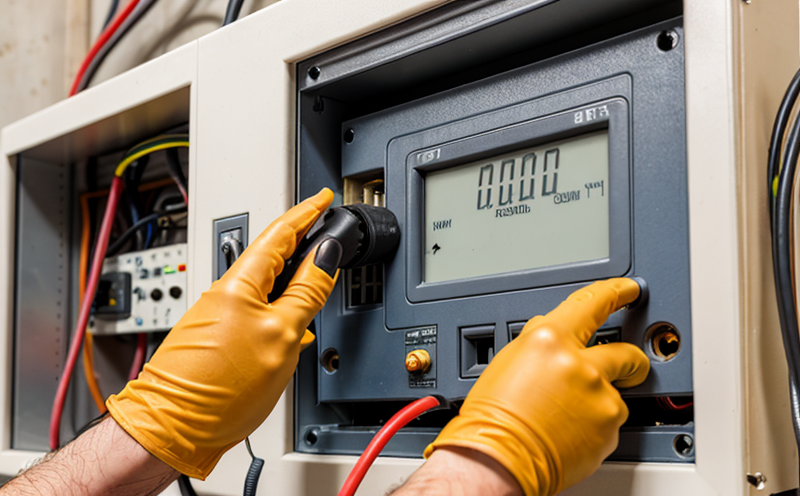BS EN 62932 Electrical Testing of Flow Batteries
The testing of flow batteries according to BS EN 62932 is a critical process that ensures the safety, efficiency, and reliability of these innovative energy storage systems. This European standard provides detailed requirements for electrical performance tests which are essential in validating the design specifications and operational parameters of flow batteries.
Flow batteries represent a significant advancement in renewable energy storage technology due to their ability to store large amounts of electricity with high power density and long cycle life. However, these advantages come at the cost of complex chemistry and fluid handling systems that must be rigorously tested before deployment. BS EN 62932 outlines standardized methods for evaluating key electrical characteristics such as open-circuit voltage (OCV), short circuit current (ISC), internal resistance (IR), and charge/discharge efficiency.
For accurate and repeatable results, adherence to the standard is paramount. This involves precise calibration of test equipment, careful preparation of flow battery modules, and thorough documentation of all test conditions. The testing process typically includes multiple cycles of charging and discharging under controlled temperature and pressure environments to simulate real-world operating scenarios.
Compliance with BS EN 62932 not only ensures product safety but also facilitates market entry into Europe by meeting regulatory requirements. It helps manufacturers demonstrate that their products meet the highest industry standards, thereby enhancing confidence among stakeholders including regulators, end-users, and investors.
- Environmental benefits: Accurate testing according to BS EN 62932 ensures efficient operation of flow batteries which contributes positively towards reducing carbon emissions from fossil fuel power plants.
- Sustainability: By promoting reliable energy storage solutions, this standard supports the transition toward sustainable energy systems by enabling more effective integration of renewable sources into existing grids.
The importance of thorough testing cannot be overstated. Neglecting any aspect could lead to suboptimal performance or even failure under extreme conditions. Therefore, investing in robust testing infrastructure and expertise is vital for any company aiming to develop reliable flow batteries.
In summary, compliance with BS EN 62932 is more than just a regulatory requirement; it represents a commitment to excellence that guarantees safe, efficient, and sustainable energy storage solutions.
Why It Matters
The significance of electrical testing according to BS EN 62932 cannot be overstated for several reasons. Firstly, flow batteries are inherently complex devices involving multiple chemical reactions within flowing liquids. Ensuring that these processes occur efficiently and safely requires meticulous attention to detail during each phase of the test.
Secondly, compliance with this standard helps establish credibility in a competitive market where trust between buyers and sellers is essential. Buyers can rely on consistent quality across batches while sellers benefit from reduced risks associated with non-compliant products.
Thirdly, by following BS EN 62932 guidelines, manufacturers contribute significantly to the overall safety of users who might be exposed to these systems daily. This includes protection against potential hazards like overheating or short circuits which could otherwise compromise user safety.
Lastly, adherence to this standard fosters innovation within the industry by setting clear benchmarks for performance metrics. Companies that excel in meeting these standards are more likely to attract investment and expand their market reach globally.
Environmental and Sustainability Contributions
- Reduction of greenhouse gas emissions: By improving the efficiency of energy storage systems, flow batteries supported by rigorous testing according to BS EN 62932 can help reduce reliance on fossil fuels.
- Enhanced resource utilization: Testing ensures that only high-quality materials and components are used in manufacturing processes, minimizing waste and promoting efficient use of resources.
- Support for renewable energy integration: Reliable flow batteries contribute to a stable grid capable of handling variable inputs from solar and wind sources.
The environmental impact of flow batteries is further mitigated through proper recycling practices which are encouraged by stringent testing protocols. This lifecycle approach ensures that even after their useful life ends, the components can be safely disposed of without harming the environment.
Use Cases and Application Examples
The versatility of flow batteries makes them suitable for a variety of applications ranging from small-scale residential setups to large commercial installations. For instance:
- Residential use: Smaller capacity flow batteries can be integrated into homes equipped with solar panels, providing backup power during outages.
- Commercial buildings: Larger systems are ideal for businesses that need uninterrupted power supply, such as data centers and hospitals.
- Renewable energy hubs: Flow batteries play a crucial role in balancing fluctuating outputs from wind farms or solar parks by storing excess energy when production exceeds demand.
In each of these scenarios, compliance with BS EN 62932 ensures optimal performance and longevity of the system. This reliability is especially important given the critical nature of uninterrupted power supply in some industries.





